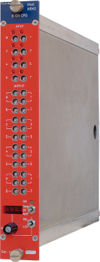Difference between revisions of "Constant Fraction Discriminator Details"
| Line 8: | Line 8: | ||
The back panel houses VETO and TEST inputs, the OR output and the Current Sum output, which generates a current proportional to the input multiplicity, i. e. to the number of channels over threshold, at a rate of -1.0 mA per hit (-50 mV per hit into a 50 Ohm load) ±20%. | The back panel houses VETO and TEST inputs, the OR output and the Current Sum output, which generates a current proportional to the input multiplicity, i. e. to the number of channels over threshold, at a rate of -1.0 mA per hit (-50 mV per hit into a 50 Ohm load) ±20%. | ||
| − | [[Image:table.jpg| | + | [[Image:table.jpg|800 px]] |
Revision as of 10:03, 4 August 2008
Overview
The Mod. N842 is an 8 Channel Constant Fraction Discriminator housed in a one unit wide NIM module. The module accepts 8 negative inputs and produces 2x8 NIM outputs (NIM outputs are provided with a fan-out of two)+ 8 /NIM outputs (negated) on front panel LEMO 00 connectors. The constant fraction delay is defined by a delay line network of 20 ns with 5 taps. The timing stage of the discriminator produces an output pulse whose width is adjustable in a range from 16.5 ns to 273 ns. Moreover, in order to protect against multiple pulsing, it is possible to program a dead time during which the discriminator is inhibited from retriggering. The maximum time walk is ±400 ps (for input signals in the range from -50 mV to -5 V with 25 ns rise time). The constant fraction is 20%. The individual discriminating thresholds are settable in a range from -1 mV to -255 mV (1 mV step) via an 8-bit DAC. The module can operate also with small (below 10 mV) input signals, though in this case the Constant Fraction operation is not performed, i.e. the time walk is higher. The channels’ threshold, output width and dead time can be programmed via two switches and one rotary handle placed on the front panel. The back panel houses VETO and TEST inputs, the OR output and the Current Sum output, which generates a current proportional to the input multiplicity, i. e. to the number of channels over threshold, at a rate of -1.0 mA per hit (-50 mV per hit into a 50 Ohm load) ±20%.

